Computer Science Engineering (CSE) Exam > Computer Science Engineering (CSE) Notes > Database Management System (DBMS) > Types of Schedules based Recoverability
Types of Schedules based Recoverability | Database Management System (DBMS) - Computer Science Engineering (CSE) PDF Download
Types of Schedules based Recoverability in DBMS
Generally, there are three types of schedule given as follows:

- Recoverable Schedule: A schedule is said to be recoverable if it is recoverable as name suggest. Only reads are allowed before write operation on same data. Only reads (Ti->Tj) is permissible.
Example:
S1: R1(x), W1(x), R2(x), R1(y), R2(y),
W2(x), W1(y), C1, C2;
Given schedule follows order of Ti → Tj => C1 → C2. Transaction T1 is executed before T2 hence there is no chances of conflict occur. R1(x) appears before W1(x) and transaction T1 is committed before T2 i.e. completion of first transaction performed first update on data item x, hence given schedule is recoverable.
Lets see example of unrecoverable schedule to clear the concept more:
S2: R1(x), R2(x), R1(z), R3(x), R3(y), W1(x),
W3(y), R2(y), W2(z), W2(y), C1, C2, C3;
Ti → Tj => C2 → C3 but W3(y) executed before W2(y) which leads to conflicts thus it must be committed before T2 transaction. So given schedule is unrecoverable. if Ti → Tj => C3 → C2 is given in schedule then it will become recoverable schedule.
Note: A committed transaction should never be rollback. It means that reading value from uncommitted transaction and commit it will enter the current transaction into inconsistent or unrecoverable state this is called Dirty Read problem.
Example: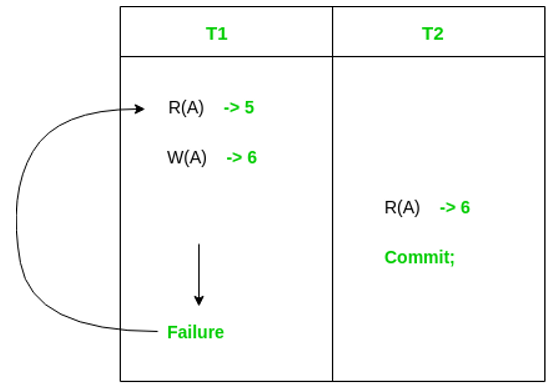 Dirty Read Problem
Dirty Read Problem - Cascadeless Schedule
When no read or write-write occurs before execution of transaction then corresponding schedule is called cascadeless schedule.
Example:
S3: R1(x), R2(z), R3(x), R1(z), R2(y), R3(y), W1(x), C1,
W2(z), W3(y), W2(y), C3, C2;
In this schedule W3(y) and W2(y) overwrite conflicts and there is no read, therefore given schedule is cascadeless schedule.
Special Case:
A committed transaction desired to abort. As given below all the transactions are reading committed data hence it’s cascadeless schedule.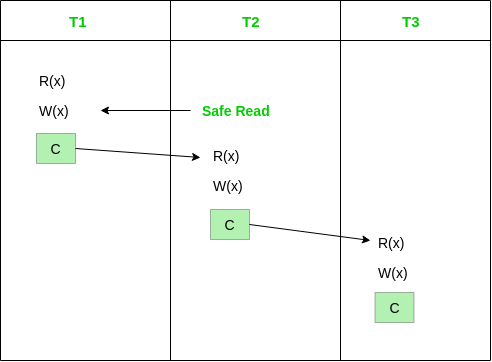
- Strict Schedule
if schedule contains no read or write before commit then it is known as strict schedule. Strict schedule is strict in nature.
Example
S4: R1(x), R2(x), R1(z), R3(x), R3(y),
W1(x), C1, W3(y), C3, R2(y), W2(z), W2(y), C2;
In this schedule no read-write or write-write conflict arises before commit hence its strict schedule: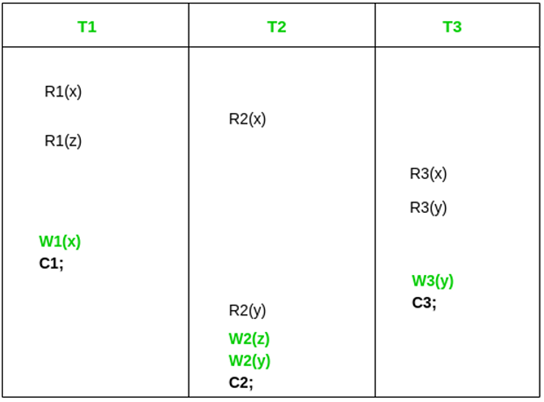 Strict Schedule
Strict Schedule - Cascading Abort
Cascading Abort can also be rollback. If transaction T1 abort as T2 read data that written by T1 which is not committed. Hence it’s cascading rollback.
Example: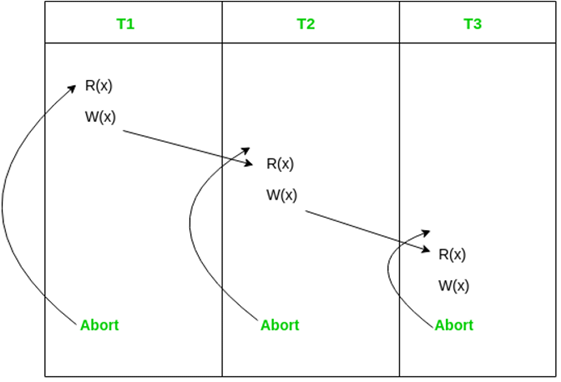
Cascading AbortCorrelation between Strict, Cascadeless and Recoverable schedule: 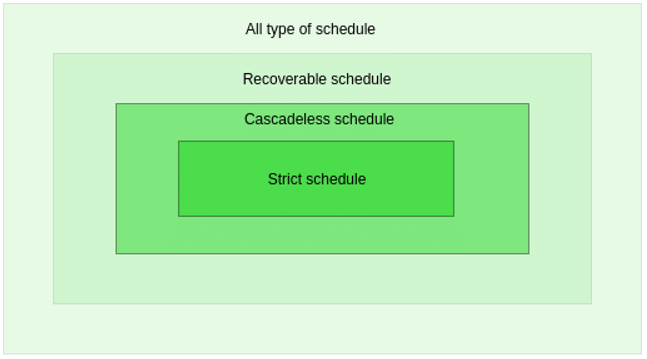 Venn diagram of these schedulesFrom above figure:
Venn diagram of these schedulesFrom above figure:- Strict schedules are all recoverable and cascadeless schedules
- All cascadeless schedules are recoverable
The document Types of Schedules based Recoverability | Database Management System (DBMS) - Computer Science Engineering (CSE) is a part of the Computer Science Engineering (CSE) Course Database Management System (DBMS).
All you need of Computer Science Engineering (CSE) at this link: Computer Science Engineering (CSE)
|
62 videos|92 docs|35 tests
|
FAQs on Types of Schedules based Recoverability - Database Management System (DBMS) - Computer Science Engineering (CSE)
| 1. What is the meaning of recoverability in DBMS? |  |
Ans. Recoverability in DBMS refers to the ability to restore the database to a consistent state after a failure or error. It ensures that all transactions are either completely committed or completely rolled back, preventing any data inconsistencies.
| 2. What are the types of schedules based on recoverability in DBMS? |  |
Ans. There are two types of schedules based on recoverability in DBMS:
a) Recoverable Schedules: These schedules ensure that if a transaction T1 reads a data item previously written by another transaction T2, then T2 must have committed before T1.
b) Cascadeless Schedules: These schedules ensure that if a transaction T1 writes a data item previously read by another transaction T2, then T2 must have committed before T1.
| 3. How does a recoverable schedule ensure data consistency? |  |
Ans. A recoverable schedule ensures data consistency by enforcing the rule that if a transaction T1 reads a data item previously written by another transaction T2, then T2 must have committed before T1. This ensures that any intermediate or uncommitted changes made by T2 are not visible to T1, preventing any data inconsistencies.
| 4. What is the difference between recoverable and cascadeless schedules? |  |
Ans. The main difference between recoverable and cascadeless schedules is their enforcement rules. A recoverable schedule enforces the rule that if T1 reads a data item previously written by T2, then T2 must have committed before T1. In contrast, a cascadeless schedule enforces the rule that if T1 writes a data item previously read by T2, then T2 must have committed before T1. Cascadeless schedules provide stronger guarantees for data consistency as compared to recoverable schedules.
| 5. Why is recoverability important in DBMS? |  |
Ans. Recoverability is important in DBMS because it ensures that the database can be restored to a consistent state after a failure or error. It prevents any data inconsistencies that may arise due to incomplete or uncommitted transactions. By enforcing recoverability, the DBMS maintains data integrity and reliability, allowing users to trust the accuracy and consistency of the stored data.
Related Searches





















